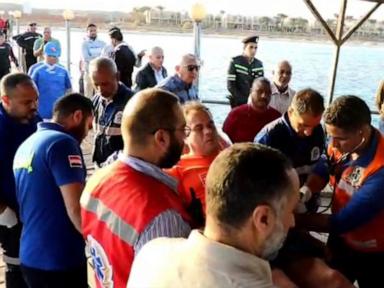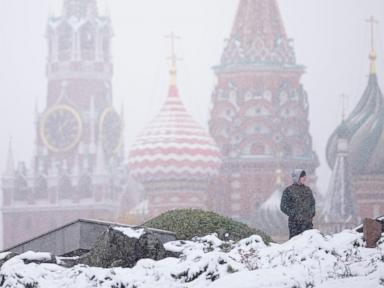ARTICLE AD BOX
ALEXEI Navalny was killed with one punch to the heart after being forced to spend hours in freezing temperatures, it has been claimed.
The brutal method was once a “hallmark of the KGB”, according to the founder of human rights group Gulagu.net.
 AFP
AFP AP
AP AP
APVladimir Putin’s most formidable domestic opponent Navalny, 47, died in prison on Friday while serving a 19-year sentence on extremism charges at the IK-3 Arctic prison colony.
Russia claimed the lawyer died of “sudden death syndrome”.
It was later alleged that his body had been found covered in bruises, as his spokeswoman Kira Yarmysh asserted he was “murdered”.
Russian-born human rights activist Vladimir Osechkin told The Times that the bruising found on Navalny’s body was consistent with the “one-punch” technique previously taught to KGB special forces operatives.
Osechkin further claimed that the Russian lawyer was forced to spend more than two and a half hours outdoors in an open-air solitary confinement space where temperatures were as low as -27C.
Prisoners were normally kept outside for no more than an hour – much less in such extreme conditions.
The Russian dissident’s information was said to have come from a source working in corrective colony FKU IK-3 – also known as the Polar Wolf jail – where Navalny died.
He said: “I think that they first destroyed his body by keeping him out in the cold for a long time and slowing the blood circulation down to a minimum.
“And then it becomes very easy to kill someone, within seconds, if the operative has some experience in this.
“It is an old method of the KGB’s special forces divisions. They trained their operatives to kill a man with one punch in the heart, in the centre of the body. It was a hallmark of the KGB.”
Former prisoners who have served sentences in the Arctic region previously reported that inmates were killed by their jailers in the same way, Osechkin added.
Russia’s Federal Penitentiary Service initially said that the Putin critic had “felt unwell” after taking a walk in the prison, “almost immediately losing consciousness”, and that medical staff were unable to save him.
A state-controlled channel on Telegram claimed the same day that he had died of a blood clot.
On Saturday, Navalny’s mother and his lawyer were informed he had died of “sudden death syndrome”.
Navalny’s heartbroken widow Yulia Navalnaya suggested on Monday that he was killed using novichok, the nerve agent which FSB assassins used in their attempt to kill him in August 2020.
Speaking on the possibility of the poison being Navalny’s cause of death, Osechkin said: “It’s possible of course, but when someone is under the control of the prison system there are many options as to how to kill them.
“Novichok would leave a trace in his body and would lead directly back to Putin, given he has tried it once before.”
Based on information provided to him by his sources, he said he believed that Navalny’s death was “a special operation that had been prepared several days in advance”.
The death of Alexei Navalny

VLADIMIR Putin's most vocal domestic foe died on Friday in the Arctic prison where he was serving a 19-year prison term.
Alexei Navalny’s death was announced by the Federal Penitentiary Service of the Yamalo-Nenets Autonomous District at 2.19 pm Moscow time on Friday, February 16.
Russia’s penitentiary service claimed Navalny “felt unwell after a walk, almost immediately losing consciousness”.
The penitentiary service stated: “The medical staff of the institution arrived immediately, and an ambulance team was called.
“All necessary resuscitation measures were carried out, which did not give positive results. Doctors of the ambulance stated the death of the convict. The causes of death are being established.”
Navalny’s mother Lyudmila, 69, was given notice of her son’s death which listed the time he died as 2.17pm local time on Friday, February 16.
Ivan Zhdanov, who directs Navalny’s Anti-Corruption Foundation, said that Navalny’s lawyer and mother were on Saturday told that he died of “sudden death syndrome”.
But an unidentified source told state-controlled RT that Navalny died from a blood clot.
Russian investigators are yet to determine the cause of Navalny’s death.
It is unclear where his body currently is, although some sources have said it was taken to a hospital morgue and showed signs of bruising.
Osechkin claimed: “It was a command from Moscow because without Moscow it would not have been possible to dismantle the cameras in the way that they did.”
Navalny’s mother Lyudmila, 69, made an emotional address to Putin on Tuesday from outside the jail where her son died, calling on the president to release his body to allow for a humane burial.
She said: “Behind me is the penal colony IK-3 Polar Wolf, where my son Alexei Navalny died on February 16.
“For the fifth day I cannot see him. They don’t give me his body and they don’t even tell me where he is.
“I appeal to you, Vladimir Putin, the solution to the issue depends only on you. Let me finally see my son.
“I demand that Alexei’s body be immediately handed over so that I can bury him humanely.”
Reports later emerged that Putin allegedly had his sights set on her other son, Oleg.
It was claimed Navalny’s younger brother, a 40-year-old dad of two, was facing a new and unspecified criminal charge in Russia.
He is currently believed to be abroad and has been seen in Cyprus and Germany.
 The last picture of Navalny, taken when he appeared via video in court on Thursday
The last picture of Navalny, taken when he appeared via video in court on Thursday AP
AP A satellite image of the prison where Navalny was locked up
A satellite image of the prison where Navalny was locked up AFP
AFP
Life of Alexei Navalny

PUTIN'S best known opponent Alexei Navalny, 47, died in prison on Friday.
Here is a timeline that took the leader of the opposition from the face of freedom in Russia and the Kremlin’s biggest foe to a hellhole Siberian prison and onto an early grave.
June 4, 1976 — Navalny is born in a western part of the Moscow region
1997 — Graduates from Russia’s RUDN university, where he majored in law
2004 — Forms a movement against rampant over-development in Moscow
2008 — Gains notoriety for calling out corruption in state-run corporation
December 2011 — Participates in mass protests sparked by reports of widespread rigging of Russia’s election, and is arrested and jailed for 15 days for “defying a government official”
March 2012 – Further mass protests break out and Navalny accuses key Kremlin cronies of corruption
July 2012 — Russia’s Investigative Committee charges Navalny with embezzlement. He rejects the claims and says they are politically motivated
2013 — Navalny runs for mayor in Moscow
July 2013 — A court in Kirov convicts Navalny of embezzlement in the Kirovles case, sentencing him to five years in prison – he appeals and is allowed to continue campaign
September 2013 — Official results show Navalny finishes second in the mayor’s race
February 2014 — Navalny is placed under house arrest
December 2014 — Navalny and his brother, Oleg, are found guilty of fraud
February 2016 — The European Court of Human Rights rules that Russia violated Navalny’s right to a fair trial
November 2016 — Russia’s Supreme Court overturns Navalny’s sentence
December 2016 — Navalny announces he will run in Russia’s 2018 presidential election
February 2017 — The Kirov court retries Navalny and upholds his five-year suspended sentence from 2013
April 2017 – Survives an assassination attempt he blames on Kremlin
December 2017 — Russia’s Central Electoral Commission bars him from running for president
August, 2020 – Navalny falls into a coma on a flight and his team suspects he was poisoned. German authorities confirm he was poisoned with a Soviet-era nerve agent.
Jan 2021 — After five months in Germany, Navalny is arrested upon his return to Russia
Feb 2021 — A Moscow court orders Navalny to serve 2 ½ years in prison
June 2021 — A Moscow court shuts down Navalny’s Foundation for Fighting Corruption and his extended political network
Feb 2022 — Russia invades Ukraine
March 2022 — Navalny is sentenced to an additional nine-year term for embezzlement and contempt of court
2023 — Over 400 Russian doctors sign an open letter to Putin, urging an end to what it calls abuse of Navalny, following reports that he was denied basic medication & suffering from slow poisoning
April, 2023 — Navalny from inside prison says he was facing new extremism and terrorism charges that could keep him behind bars for the rest of his life
Aug 2023 – A court in Russia extends Navalny’s prison sentence by 19 years
Dec 2023 – He disappears from his prison as his team fear he could be assassination. He then reappears weeks later in one of Siberia’s toughest prisons – the ‘Polar Wolf’ colony
.png)
 9 months ago
6
9 months ago
6








 English (US)
English (US)